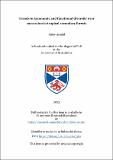Files in this item
Trends in taxonomic and functional diversity over succession in tropical secondary forests
Item metadata
| dc.contributor.advisor | Magurran, Anne E. | |
| dc.contributor.advisor | Deacon, Amy E. | |
| dc.contributor.author | Arnold, Haley | |
| dc.coverage.spatial | 268 | en_US |
| dc.date.accessioned | 2023-03-23T09:52:55Z | |
| dc.date.available | 2023-03-23T09:52:55Z | |
| dc.date.issued | 2023-06-14 | |
| dc.identifier.uri | https://hdl.handle.net/10023/27245 | |
| dc.description.abstract | Biodiverse tropical forests are declining rapidly, due in part to the appropriation of natural land for human use. There is an urgent need to better understand how biodiversity changes in response to this landscape transformation, and to find conservation solutions that support both people and nature. Cacao farming, a valuable source of agricultural revenue in many tropical countries, can lead to a mosaic of both active and abandoned agroforests. These abandoned agroforests undergo secondary succession and have the potential to be important reservoirs of biodiversity. To evaluate this potential, I assessed the biodiversity of active cacao agroforests, abandoned agroforests, and primary forest on the tropical island of Trinidad. I surveyed tree, ground vegetation, epiphyte, and bird assemblages, and computed taxonomic and functional diversity. I further asked whether there are generalisable patterns of biodiversity change over succession across taxa, and how my results fit within the wider narrative of ecological succession theory and research. I found that taxonomic and functional alpha-diversity in all assemblages were mostly either maintained throughout succession, or recovered quickly across taxa. There were, however, substantial changes in taxonomic and functional composition (beta- diversity) over succession, with patterns of biodiversity change largely uncorrelated across taxa. Overall, there was little congruence between expectations based on theory and existing empirical research, and the results of my study. This outcome emphasises the need to deepen our understanding of successional processes across biomes, starting points of succession, and taxa. My research also highlights that, while primary forests contain more specialist species, actively cultivated cacao agroforests and young secondary forests in Trinidad are remarkably biodiverse and jointly contribute to supporting regional gamma diversity. These results place cacao agroforests within a people and nature framework, and demonstrate that human-altered habitats can be important reservoirs of tropical biodiversity. | en_US |
| dc.language.iso | en | en_US |
| dc.relation | Trends in taxonomic and functional diversity over succession in tropical secondary forests (Thesis data) Arnold, H., University of St Andrews, 3 Mar 2024. DOI: https://doi.org/10.17630/17a12001-809c-4368-b11f-a6828500b8a0 | en |
| dc.relation.uri | https://doi.org/10.17630/17a12001-809c-4368-b11f-a6828500b8a0 | |
| dc.subject | Biodiversity | en_US |
| dc.subject | Forest ecology | en_US |
| dc.subject | Cacao | en_US |
| dc.subject | Trinidad | en_US |
| dc.subject | Secondary succession | en_US |
| dc.subject | Agroforestry | en_US |
| dc.subject | People and nature | en_US |
| dc.subject | Tropical forest | en_US |
| dc.subject | Bird diversity | en_US |
| dc.subject | Tree diversity | en_US |
| dc.subject | Plant diversity | en_US |
| dc.subject | Biodiversity conservation | en_US |
| dc.subject | Cocoa | en_US |
| dc.subject.lcc | QH109.T8A8 | |
| dc.subject.lcsh | Biodiversity--Trinidad and Tobago | en |
| dc.subject.lcsh | Forest ecology--Trinidad and Tobago | en |
| dc.subject.lcsh | Cacao growers--Trinidad and Tobago | en |
| dc.title | Trends in taxonomic and functional diversity over succession in tropical secondary forests | en_US |
| dc.type | Thesis | en_US |
| dc.contributor.sponsor | University of St Andrews. St Leonard’s Scholarship | en_US |
| dc.contributor.sponsor | University of St Andrews. School of Biology. Harold Mitchell Bequest for Caribbean Research | en_US |
| dc.type.qualificationlevel | Doctoral | en_US |
| dc.type.qualificationname | PhD Doctor of Philosophy | en_US |
| dc.publisher.institution | The University of St Andrews | en_US |
| dc.publisher.department | The University of the West Indies St Augustine | en_US |
| dc.rights.embargoreason | Embargo period has ended, thesis made available in accordance with University regulations | en |
| dc.identifier.doi | https://doi.org/10.17630/sta/362 |
This item appears in the following Collection(s)
Items in the St Andrews Research Repository are protected by copyright, with all rights reserved, unless otherwise indicated.

